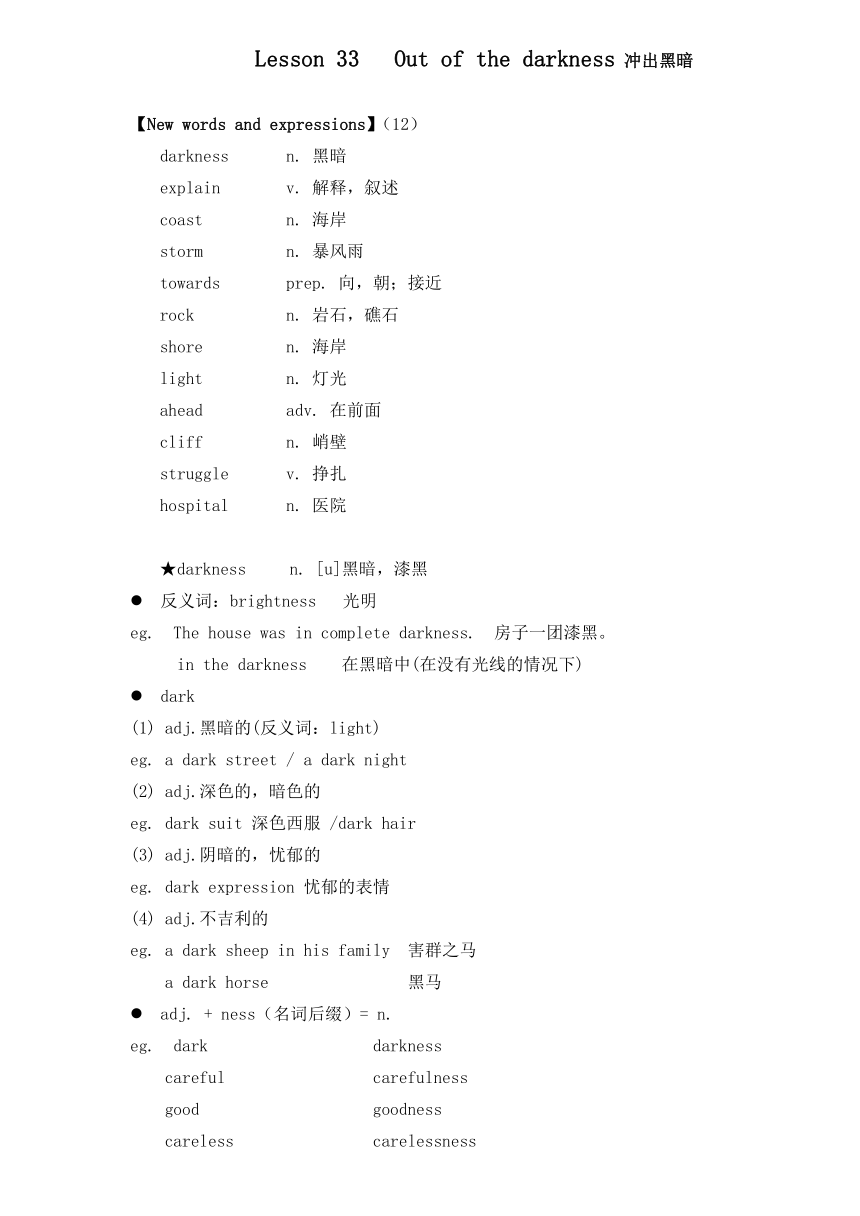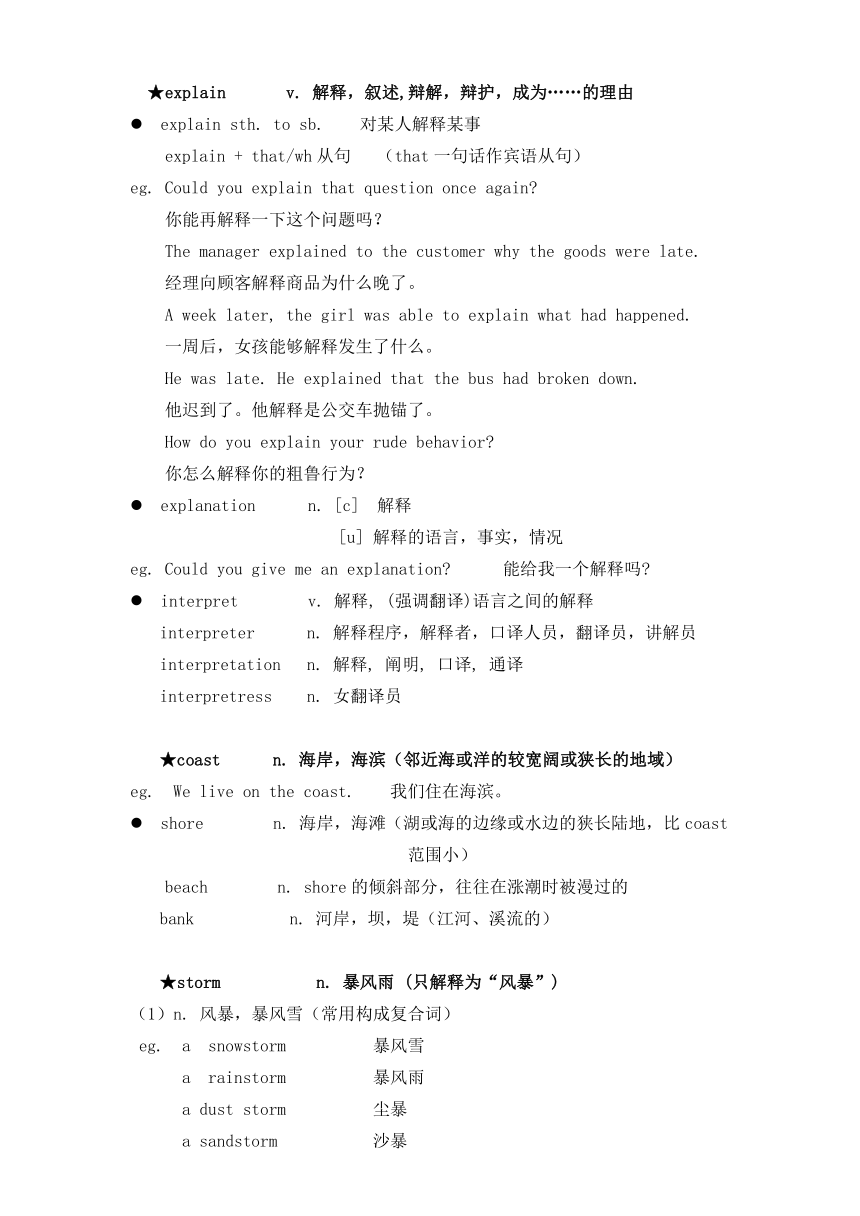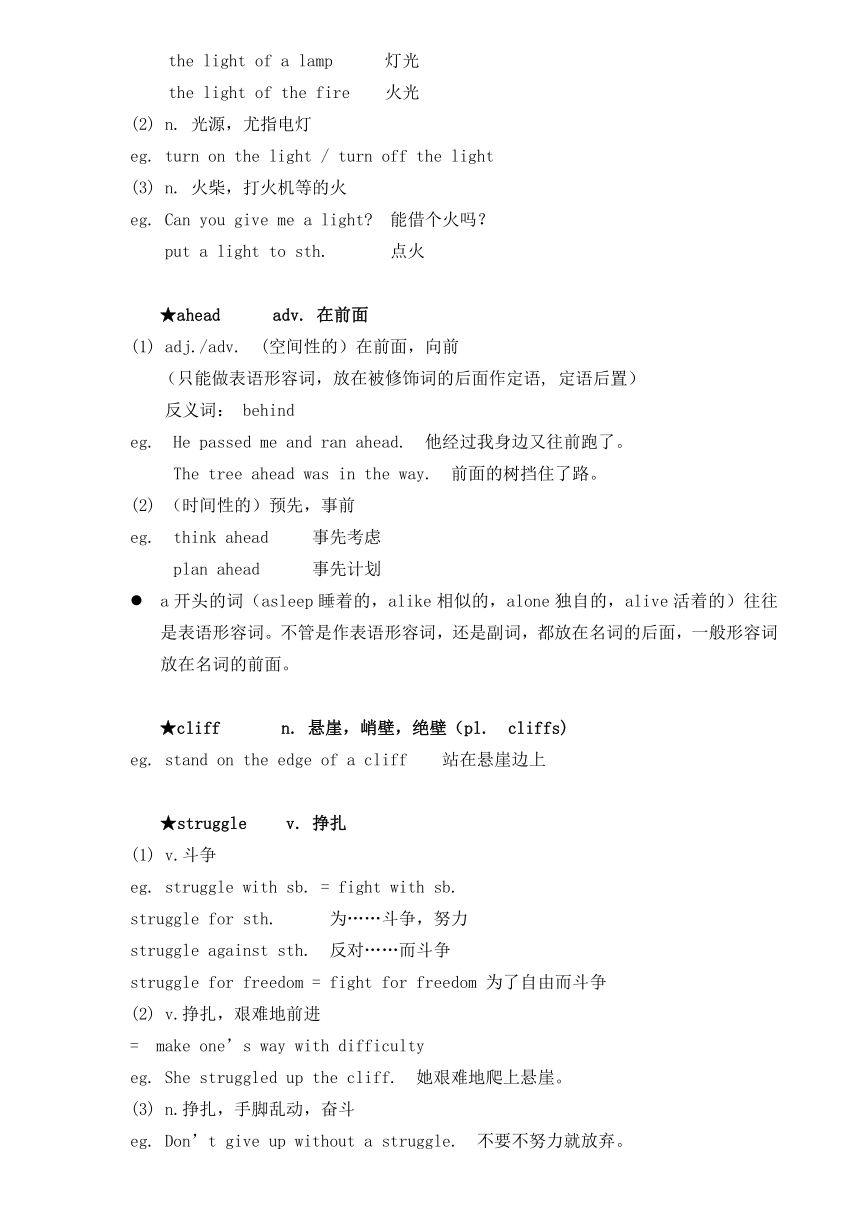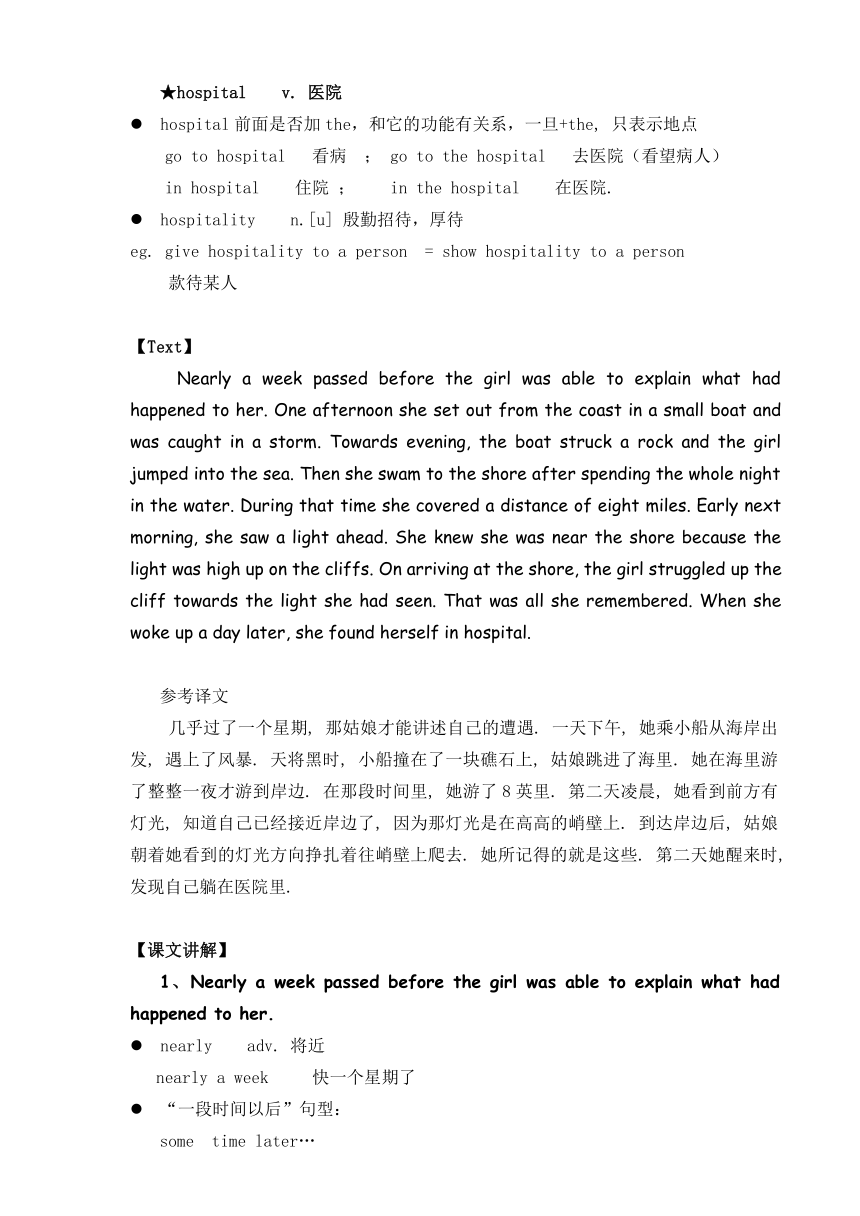新概念英语二册超详教案讲义笔记Lesson 33 Out of the darkness 冲出黑暗
文档属性
| 名称 | 新概念英语二册超详教案讲义笔记Lesson 33 Out of the darkness 冲出黑暗 |  | |
| 格式 | docx | ||
| 文件大小 | 32.9KB | ||
| 资源类型 | 教案 | ||
| 版本资源 | 新概念英语 | ||
| 科目 | 英语 | ||
| 更新时间 | 2023-09-26 06:51:45 | ||
图片预览





文档简介
Lesson 33 Out of the darkness 冲出黑暗
【New words and expressions】(12)
darkness n. 黑暗
explain v. 解释,叙述
coast n. 海岸
storm n. 暴风雨
towards prep. 向,朝;接近
rock n. 岩石,礁石
shore n. 海岸
light n. 灯光
ahead adv. 在前面
cliff n. 峭壁
struggle v. 挣扎
hospital n. 医院
★darkness n. [u]黑暗,漆黑
反义词:brightness 光明
eg. The house was in complete darkness. 房子一团漆黑。
in the darkness 在黑暗中(在没有光线的情况下)
dark
adj.黑暗的(反义词:light)
eg. a dark street / a dark night
adj.深色的,暗色的
eg. dark suit 深色西服 /dark hair
adj.阴暗的,忧郁的
eg. dark expression 忧郁的表情
adj.不吉利的
eg. a dark sheep in his family 害群之马
a dark horse 黑马
adj. + ness(名词后缀)= n.
eg. dark darkness
careful carefulness
good goodness
careless carelessness
★explain v. 解释,叙述,辩解,辩护,成为……的理由
explain sth. to sb. 对某人解释某事
explain + that/wh从句 (that一句话作宾语从句)
eg. Could you explain that question once again
你能再解释一下这个问题吗?
The manager explained to the customer why the goods were late.
经理向顾客解释商品为什么晚了。
A week later, the girl was able to explain what had happened.
一周后,女孩能够解释发生了什么。
He was late. He explained that the bus had broken down.
他迟到了。他解释是公交车抛锚了。
How do you explain your rude behavior
你怎么解释你的粗鲁行为?
explanation n. [c] 解释
[u] 解释的语言,事实,情况
eg. Could you give me an explanation 能给我一个解释吗
interpret v. 解释, (强调翻译)语言之间的解释
interpreter n. 解释程序,解释者,口译人员,翻译员,讲解员
interpretation n. 解释, 阐明, 口译, 通译
interpretress n. 女翻译员
★coast n. 海岸,海滨(邻近海或洋的较宽阔或狭长的地域)
eg. We live on the coast. 我们住在海滨。
shore n. 海岸,海滩(湖或海的边缘或水边的狭长陆地,比coast
范围小)
beach n. shore的倾斜部分,往往在涨潮时被漫过的
bank n. 河岸,坝,堤(江河、溪流的)
★storm n. 暴风雨 (只解释为“风暴”)
(1)n. 风暴,暴风雪(常用构成复合词)
eg. a snowstorm 暴风雪
a rainstorm 暴风雨
a dust storm 尘暴
a sandstorm 沙暴
a thunderstorm 大雷雨
brainstorm 头脑风暴,群策群力
be caught in a storm 遭遇暴风雨
be caught in the rain 淋雨
(3)wind 风
breeze 微风
tornado 龙卷风
cyclone 暴风,旋风
gust 阵风
gale 强风
hurricane 飓风
typhoon 台风
storm 风暴
★towards prep. 向, 朝, 接近
towards 强调nearer and nearer(强调越来越近)
★rock n. 岩石, 礁石
(1) n. 岩石
eg. The house is built on a rock.
climb up a rock 爬上岩石
rocks(pl.) 暗礁
eg. run up on the rocks 触礁
(3) rock candy 冰糖(美)
sugar candy 冰糖(英)
v.摇动,震动,晃动
eg. rock a baby to sleep = rock a baby asleep 晃婴儿睡觉
v.使(某人)震惊
eg. The news of the president’s death rocked the company.
总裁的去世使公司震惊。
rock’n’roll 摇滚乐
(20世纪50年代由黑人音乐和西部乡村音乐混合而成)
★light n. 灯光
n. 光线,光亮
eg. the light of the sun 阳光
the light of a lamp 灯光
the light of the fire 火光
n. 光源,尤指电灯
eg. turn on the light / turn off the light
n. 火柴,打火机等的火
eg. Can you give me a light 能借个火吗?
put a light to sth. 点火
★ahead adv. 在前面
adj./adv. (空间性的)在前面,向前
(只能做表语形容词,放在被修饰词的后面作定语, 定语后置)
反义词: behind
eg. He passed me and ran ahead. 他经过我身边又往前跑了。
The tree ahead was in the way. 前面的树挡住了路。
(时间性的)预先,事前
eg. think ahead 事先考虑
plan ahead 事先计划
a开头的词(asleep睡着的,alike相似的,alone独自的,alive活着的)往往是表语形容词。不管是作表语形容词,还是副词,都放在名词的后面,一般形容词放在名词的前面。
★cliff n. 悬崖,峭壁,绝壁(pl. cliffs)
eg. stand on the edge of a cliff 站在悬崖边上
★struggle v. 挣扎
v.斗争
eg. struggle with sb. = fight with sb.
struggle for sth. 为……斗争,努力
struggle against sth. 反对……而斗争
struggle for freedom = fight for freedom 为了自由而斗争
v.挣扎,艰难地前进
= make one’s way with difficulty
eg. She struggled up the cliff. 她艰难地爬上悬崖。
n.挣扎,手脚乱动,奋斗
eg. Don’t give up without a struggle. 不要不努力就放弃。
★hospital v. 医院
hospital前面是否加the,和它的功能有关系,一旦+the, 只表示地点
go to hospital 看病 ; go to the hospital 去医院(看望病人)
in hospital 住院 ; in the hospital 在医院.
hospitality n.[u] 殷勤招待,厚待
eg. give hospitality to a person = show hospitality to a person
款待某人
【Text】
Nearly a week passed before the girl was able to explain what had happened to her. One afternoon she set out from the coast in a small boat and was caught in a storm. Towards evening, the boat struck a rock and the girl jumped into the sea. Then she swam to the shore after spending the whole night in the water. During that time she covered a distance of eight miles. Early next morning, she saw a light ahead. She knew she was near the shore because the light was high up on the cliffs. On arriving at the shore, the girl struggled up the cliff towards the light she had seen. That was all she remembered. When she woke up a day later, she found herself in hospital.
参考译文
几乎过了一个星期, 那姑娘才能讲述自己的遭遇. 一天下午, 她乘小船从海岸出发, 遇上了风暴. 天将黑时, 小船撞在了一块礁石上, 姑娘跳进了海里. 她在海里游了整整一夜才游到岸边. 在那段时间里, 她游了8英里. 第二天凌晨, 她看到前方有灯光, 知道自己已经接近岸边了, 因为那灯光是在高高的峭壁上. 到达岸边后, 姑娘朝着她看到的灯光方向挣扎着往峭壁上爬去. 她所记得的就是这些. 第二天她醒来时, 发现自己躺在医院里.
【课文讲解】
1、Nearly a week passed before the girl was able to explain what had happened to her.
nearly adv. 将近
nearly a week 快一个星期了
“一段时间以后”句型:
some time later…
Three days later, my mother returned. (强调某人做某事,简单句)
Three days passed and then my mother returned.
并列句, 既强调某人做某事, 又强调时间(有多久)
…passed before…
eg. Three days passed before my mother returned.
强调时间(这么久的时间, 时间状语从句, 后面是从句)
be able to 与can的区别:
(1) be able to 可用于任何时态; can只可用于现在时或过去时(can/could)
(2) be able to强调有能力, 且能够成功(还强调成功)was/were able to;
can 只表示能力
eg. I can swim across the river.
我能游过这条河(但没有游过,不知道能不能成功)
I was able to swim across the river.
can: 能够,有可能性做某事
be able to:有能力,有办法做某事
eg. There is no paper. I can’t write. 没有纸,我不能写。
The child is not able to write. 那个孩子不会写字。
explain 解释
what had happened to her 作动词explain的宾语从句
passed
原形:pass v. 经过
eg. He passed my house this morning. 今天早上他经过我的房子。
pass the exam 考试及格
fail in the exam 考试不及格
past
prep. 经过
eg. He walked past my house. 他走过我的房子。
adj. 过去的
eg. He told me about his past experience. 他告诉我过去的经历。
n. 过去
eg. He seems to live in the past. 他看上去生活在过去。
the past, the present and the future 过去,现在和未来
2、One afternoon she set out from the coast in a small boat and was caught in a storm.
one afternoon, 不能说成an afternoon
本文以时间为线索,随着时间推移展开故事,本文时间状语为:
one afternoon, towards evening, early next morning,
when she woke up a day later
set out = set off = begin a journey 出发
set out from… 从……出发
be caught in+灾难 (突然)遇到/上(风暴等)
be caught in a earthquake 遇上地震
He was caught in a rain when he left. 他刚一离开, 就下雨了
(遇上人用meet, 遇上灾难用be caught in…)
3、Towards evening, the boat struck a rock and the girl jumped into the sea.
towards evening 天越来越晚
strike强调的往往是猛烈的撞击(strike struck struck) = hit
Then she swam to the shore after spending the whole night in the water.
after是介词,spending是动名词
“to”强调朝那个方向去, 但没有强调越来越近;
“towards”朝那个方向去,强调距离越来越近
5、During that time she covered a distance of eight miles.
during that time是时间状语
of eight miles是介词短语,作定语修饰distance
cover
(1) v.可笼统地表示“行过(一段路程)”,根据上下文可具体译为“走过、飞过、游过”等。(不用被动语态)
eg. The bird covered the distance in three minutes.
a distance of+具体长度 多长的距离,表示具体的距离
the red army covered a distance of 25000… 两万五千里长征
v. 遮盖,隐瞒,蒙蔽,(用东西)覆盖(此处可用被动语态)
eg. He tried to cover his mistake. 他试图隐瞒错误。
His desk was covered with dust. 他的桌子上满是灰尘。
n. 盖子,覆盖物
6、Early next morning, she saw a light ahead.
next: 下面的,接下来的
other: 另外的
the next day 第二天
the other day = a few days ago 几天前
a light ahead 前方的一盏灯(ahead 放在被修饰词的后面)
7、She knew she was near the shore because the light was high up on the cliffs.
she was near the shore作she knew的宾语从句。
because the light was high up on the cliffs作原因状语从句。
8、On arriving at the shore, the girl struggled up the cliff towards the light she had seen.
on doing sth. 一……就
= As soon as she arrived at the shore
“on +动名词”相当于一个由as soon as=the moment或when引导的时间状语从句,as soon as=the moment后面要加句子,on 后面一定要加动词ing, 用on doing表“一……就”,前提是动名词doing的逻辑主语必须与主句主语一致。
eg. On hearing the news, she cried. 一听到这个消息,她就哭了。
On seeing the girl, he didn’t know what to say.
一见到这个女孩,他不知道说什么好。
On reaching the airport, he was arrested by the police.
“…up the cliff towards the…”用两个介词起到动词的作用,up在此处为介词,表示“沿着……往上”
9、That was all she remembered.
all作表语,是先行词, she remembered 修饰 all 作定语从句, 省略 引导词that。
eg. That was all I wanted to say. 那就是我想说的全部
That was all I can do for you.=I can do nothing else for you.
10、When she woke up a day later, she found herself in hospital.
She found herself in hospital.(介词短语作宾语补足语)
主 谓 宾 宾补
find +宾语+宾补 发现……(宾补可以由形容词或介词短语充当)
eg. I find myself stupid. 我发现自己很笨。
I found the film boring. 我发现这部电影很枯燥。
I found him unhonest. 我发现他不诚实。
We found him a liar. 我们发现他是个大骗子。
(名词liar作宾语补足语)
He is finding the trip very exciting.他发现旅途非常刺激。
总结:
课文中表方位的介词应用:
(1) set out from the coast
(2) jump into the sea
(3) swim to the shore
(4) towards the light
【Key structures】
表示方向和目的地的介词和副词
① 表示“上、下”的两对小品词是on和off,up和down
Jim’s standing on the roof. I hope he won’t fall off.
Tom’s climbing up the tree. I hope he won’t fall down.
② 表示“来、去”的一对小品词是from和to;towards(强调越来越近)的意义和to(强调目标)相近,表示“朝,向,接近”等;for在有些动词后面也表示“往,向”的意思
The ball was coming towards me.
The plane flies from Moscow to New York.
He went for home.
leave for… 动身到某地(强调离开,出发)
Yesterday my father left for Tianjin.
set out for… 动身到某地
He left/ set out for New York yesterday.
head for/to 前往 (强调“去”)
③ 表示“进去,出来”这两种方向的介词为into(进、入)和out of(从...出来);表示“在某个地方”或“在……里面/外面”可用at(含有一种瞄准的概念,方向性),in,out of等;表示目的地或位置往往用at
aim at,fire at(瞄准开火),throw at,threw to the bank
Tell him go into my house.
Did you stop anywhere on your way to the office
去办公室的路上你在别的地方逗留过吗?
④ 表示“穿过,越过,绕过”等动词时,往往用through,across,under,over,round等介词
How did you get through the fence 你怎么穿过篱笆的?
How did you get over the wall
【Special difficulties】
Pass and Past
pass和past的区别主要是词义上的区别,pass是动词,其过去式为passed,过去分词是passed或past。当作及物动词用时,可表示“经过,通过(考试),超过”等,作不及物动词用时可表示“(时间等)消逝”。
Your sister passed me in her new car, driving great speed.
I’ve passed/past my French test.
A month has passed/past since I left home.
past可以作形容词、介词、名词等,作形容词时表示“以前的,过去的”等;作介词时表示“经过,超出(范围等)”;作名词时表示“过去,昔时,往事”等。
Frank is proud of his past experience.
I go past the garden.
Can you tell me something about your past
Next and Other
next表示时间顺序上“紧接的,下一个”,如果以现在为基准,则next前一般不加the;如果以过去或将来的某一时间为基准,则next前面要加the或其他修饰词。
next day 第二天
Mary phoned the next day to tell us that she couldn’t come to the party.
第二天玛丽打来电话告诉我们她不能参加晚会了。
the other day =a few days ago (几天前),
Mary phoned the other day to tell us that she had arrived in London.
前几天玛丽来电话告诉我们她已到达伦敦。
the other day 出现一定是过去时;next day有可能是过去式, 有可能是将来式
【New words and expressions】(12)
darkness n. 黑暗
explain v. 解释,叙述
coast n. 海岸
storm n. 暴风雨
towards prep. 向,朝;接近
rock n. 岩石,礁石
shore n. 海岸
light n. 灯光
ahead adv. 在前面
cliff n. 峭壁
struggle v. 挣扎
hospital n. 医院
★darkness n. [u]黑暗,漆黑
反义词:brightness 光明
eg. The house was in complete darkness. 房子一团漆黑。
in the darkness 在黑暗中(在没有光线的情况下)
dark
adj.黑暗的(反义词:light)
eg. a dark street / a dark night
adj.深色的,暗色的
eg. dark suit 深色西服 /dark hair
adj.阴暗的,忧郁的
eg. dark expression 忧郁的表情
adj.不吉利的
eg. a dark sheep in his family 害群之马
a dark horse 黑马
adj. + ness(名词后缀)= n.
eg. dark darkness
careful carefulness
good goodness
careless carelessness
★explain v. 解释,叙述,辩解,辩护,成为……的理由
explain sth. to sb. 对某人解释某事
explain + that/wh从句 (that一句话作宾语从句)
eg. Could you explain that question once again
你能再解释一下这个问题吗?
The manager explained to the customer why the goods were late.
经理向顾客解释商品为什么晚了。
A week later, the girl was able to explain what had happened.
一周后,女孩能够解释发生了什么。
He was late. He explained that the bus had broken down.
他迟到了。他解释是公交车抛锚了。
How do you explain your rude behavior
你怎么解释你的粗鲁行为?
explanation n. [c] 解释
[u] 解释的语言,事实,情况
eg. Could you give me an explanation 能给我一个解释吗
interpret v. 解释, (强调翻译)语言之间的解释
interpreter n. 解释程序,解释者,口译人员,翻译员,讲解员
interpretation n. 解释, 阐明, 口译, 通译
interpretress n. 女翻译员
★coast n. 海岸,海滨(邻近海或洋的较宽阔或狭长的地域)
eg. We live on the coast. 我们住在海滨。
shore n. 海岸,海滩(湖或海的边缘或水边的狭长陆地,比coast
范围小)
beach n. shore的倾斜部分,往往在涨潮时被漫过的
bank n. 河岸,坝,堤(江河、溪流的)
★storm n. 暴风雨 (只解释为“风暴”)
(1)n. 风暴,暴风雪(常用构成复合词)
eg. a snowstorm 暴风雪
a rainstorm 暴风雨
a dust storm 尘暴
a sandstorm 沙暴
a thunderstorm 大雷雨
brainstorm 头脑风暴,群策群力
be caught in a storm 遭遇暴风雨
be caught in the rain 淋雨
(3)wind 风
breeze 微风
tornado 龙卷风
cyclone 暴风,旋风
gust 阵风
gale 强风
hurricane 飓风
typhoon 台风
storm 风暴
★towards prep. 向, 朝, 接近
towards 强调nearer and nearer(强调越来越近)
★rock n. 岩石, 礁石
(1) n. 岩石
eg. The house is built on a rock.
climb up a rock 爬上岩石
rocks(pl.) 暗礁
eg. run up on the rocks 触礁
(3) rock candy 冰糖(美)
sugar candy 冰糖(英)
v.摇动,震动,晃动
eg. rock a baby to sleep = rock a baby asleep 晃婴儿睡觉
v.使(某人)震惊
eg. The news of the president’s death rocked the company.
总裁的去世使公司震惊。
rock’n’roll 摇滚乐
(20世纪50年代由黑人音乐和西部乡村音乐混合而成)
★light n. 灯光
n. 光线,光亮
eg. the light of the sun 阳光
the light of a lamp 灯光
the light of the fire 火光
n. 光源,尤指电灯
eg. turn on the light / turn off the light
n. 火柴,打火机等的火
eg. Can you give me a light 能借个火吗?
put a light to sth. 点火
★ahead adv. 在前面
adj./adv. (空间性的)在前面,向前
(只能做表语形容词,放在被修饰词的后面作定语, 定语后置)
反义词: behind
eg. He passed me and ran ahead. 他经过我身边又往前跑了。
The tree ahead was in the way. 前面的树挡住了路。
(时间性的)预先,事前
eg. think ahead 事先考虑
plan ahead 事先计划
a开头的词(asleep睡着的,alike相似的,alone独自的,alive活着的)往往是表语形容词。不管是作表语形容词,还是副词,都放在名词的后面,一般形容词放在名词的前面。
★cliff n. 悬崖,峭壁,绝壁(pl. cliffs)
eg. stand on the edge of a cliff 站在悬崖边上
★struggle v. 挣扎
v.斗争
eg. struggle with sb. = fight with sb.
struggle for sth. 为……斗争,努力
struggle against sth. 反对……而斗争
struggle for freedom = fight for freedom 为了自由而斗争
v.挣扎,艰难地前进
= make one’s way with difficulty
eg. She struggled up the cliff. 她艰难地爬上悬崖。
n.挣扎,手脚乱动,奋斗
eg. Don’t give up without a struggle. 不要不努力就放弃。
★hospital v. 医院
hospital前面是否加the,和它的功能有关系,一旦+the, 只表示地点
go to hospital 看病 ; go to the hospital 去医院(看望病人)
in hospital 住院 ; in the hospital 在医院.
hospitality n.[u] 殷勤招待,厚待
eg. give hospitality to a person = show hospitality to a person
款待某人
【Text】
Nearly a week passed before the girl was able to explain what had happened to her. One afternoon she set out from the coast in a small boat and was caught in a storm. Towards evening, the boat struck a rock and the girl jumped into the sea. Then she swam to the shore after spending the whole night in the water. During that time she covered a distance of eight miles. Early next morning, she saw a light ahead. She knew she was near the shore because the light was high up on the cliffs. On arriving at the shore, the girl struggled up the cliff towards the light she had seen. That was all she remembered. When she woke up a day later, she found herself in hospital.
参考译文
几乎过了一个星期, 那姑娘才能讲述自己的遭遇. 一天下午, 她乘小船从海岸出发, 遇上了风暴. 天将黑时, 小船撞在了一块礁石上, 姑娘跳进了海里. 她在海里游了整整一夜才游到岸边. 在那段时间里, 她游了8英里. 第二天凌晨, 她看到前方有灯光, 知道自己已经接近岸边了, 因为那灯光是在高高的峭壁上. 到达岸边后, 姑娘朝着她看到的灯光方向挣扎着往峭壁上爬去. 她所记得的就是这些. 第二天她醒来时, 发现自己躺在医院里.
【课文讲解】
1、Nearly a week passed before the girl was able to explain what had happened to her.
nearly adv. 将近
nearly a week 快一个星期了
“一段时间以后”句型:
some time later…
Three days later, my mother returned. (强调某人做某事,简单句)
Three days passed and then my mother returned.
并列句, 既强调某人做某事, 又强调时间(有多久)
…passed before…
eg. Three days passed before my mother returned.
强调时间(这么久的时间, 时间状语从句, 后面是从句)
be able to 与can的区别:
(1) be able to 可用于任何时态; can只可用于现在时或过去时(can/could)
(2) be able to强调有能力, 且能够成功(还强调成功)was/were able to;
can 只表示能力
eg. I can swim across the river.
我能游过这条河(但没有游过,不知道能不能成功)
I was able to swim across the river.
can: 能够,有可能性做某事
be able to:有能力,有办法做某事
eg. There is no paper. I can’t write. 没有纸,我不能写。
The child is not able to write. 那个孩子不会写字。
explain 解释
what had happened to her 作动词explain的宾语从句
passed
原形:pass v. 经过
eg. He passed my house this morning. 今天早上他经过我的房子。
pass the exam 考试及格
fail in the exam 考试不及格
past
prep. 经过
eg. He walked past my house. 他走过我的房子。
adj. 过去的
eg. He told me about his past experience. 他告诉我过去的经历。
n. 过去
eg. He seems to live in the past. 他看上去生活在过去。
the past, the present and the future 过去,现在和未来
2、One afternoon she set out from the coast in a small boat and was caught in a storm.
one afternoon, 不能说成an afternoon
本文以时间为线索,随着时间推移展开故事,本文时间状语为:
one afternoon, towards evening, early next morning,
when she woke up a day later
set out = set off = begin a journey 出发
set out from… 从……出发
be caught in+灾难 (突然)遇到/上(风暴等)
be caught in a earthquake 遇上地震
He was caught in a rain when he left. 他刚一离开, 就下雨了
(遇上人用meet, 遇上灾难用be caught in…)
3、Towards evening, the boat struck a rock and the girl jumped into the sea.
towards evening 天越来越晚
strike强调的往往是猛烈的撞击(strike struck struck) = hit
Then she swam to the shore after spending the whole night in the water.
after是介词,spending是动名词
“to”强调朝那个方向去, 但没有强调越来越近;
“towards”朝那个方向去,强调距离越来越近
5、During that time she covered a distance of eight miles.
during that time是时间状语
of eight miles是介词短语,作定语修饰distance
cover
(1) v.可笼统地表示“行过(一段路程)”,根据上下文可具体译为“走过、飞过、游过”等。(不用被动语态)
eg. The bird covered the distance in three minutes.
a distance of+具体长度 多长的距离,表示具体的距离
the red army covered a distance of 25000… 两万五千里长征
v. 遮盖,隐瞒,蒙蔽,(用东西)覆盖(此处可用被动语态)
eg. He tried to cover his mistake. 他试图隐瞒错误。
His desk was covered with dust. 他的桌子上满是灰尘。
n. 盖子,覆盖物
6、Early next morning, she saw a light ahead.
next: 下面的,接下来的
other: 另外的
the next day 第二天
the other day = a few days ago 几天前
a light ahead 前方的一盏灯(ahead 放在被修饰词的后面)
7、She knew she was near the shore because the light was high up on the cliffs.
she was near the shore作she knew的宾语从句。
because the light was high up on the cliffs作原因状语从句。
8、On arriving at the shore, the girl struggled up the cliff towards the light she had seen.
on doing sth. 一……就
= As soon as she arrived at the shore
“on +动名词”相当于一个由as soon as=the moment或when引导的时间状语从句,as soon as=the moment后面要加句子,on 后面一定要加动词ing, 用on doing表“一……就”,前提是动名词doing的逻辑主语必须与主句主语一致。
eg. On hearing the news, she cried. 一听到这个消息,她就哭了。
On seeing the girl, he didn’t know what to say.
一见到这个女孩,他不知道说什么好。
On reaching the airport, he was arrested by the police.
“…up the cliff towards the…”用两个介词起到动词的作用,up在此处为介词,表示“沿着……往上”
9、That was all she remembered.
all作表语,是先行词, she remembered 修饰 all 作定语从句, 省略 引导词that。
eg. That was all I wanted to say. 那就是我想说的全部
That was all I can do for you.=I can do nothing else for you.
10、When she woke up a day later, she found herself in hospital.
She found herself in hospital.(介词短语作宾语补足语)
主 谓 宾 宾补
find +宾语+宾补 发现……(宾补可以由形容词或介词短语充当)
eg. I find myself stupid. 我发现自己很笨。
I found the film boring. 我发现这部电影很枯燥。
I found him unhonest. 我发现他不诚实。
We found him a liar. 我们发现他是个大骗子。
(名词liar作宾语补足语)
He is finding the trip very exciting.他发现旅途非常刺激。
总结:
课文中表方位的介词应用:
(1) set out from the coast
(2) jump into the sea
(3) swim to the shore
(4) towards the light
【Key structures】
表示方向和目的地的介词和副词
① 表示“上、下”的两对小品词是on和off,up和down
Jim’s standing on the roof. I hope he won’t fall off.
Tom’s climbing up the tree. I hope he won’t fall down.
② 表示“来、去”的一对小品词是from和to;towards(强调越来越近)的意义和to(强调目标)相近,表示“朝,向,接近”等;for在有些动词后面也表示“往,向”的意思
The ball was coming towards me.
The plane flies from Moscow to New York.
He went for home.
leave for… 动身到某地(强调离开,出发)
Yesterday my father left for Tianjin.
set out for… 动身到某地
He left/ set out for New York yesterday.
head for/to 前往 (强调“去”)
③ 表示“进去,出来”这两种方向的介词为into(进、入)和out of(从...出来);表示“在某个地方”或“在……里面/外面”可用at(含有一种瞄准的概念,方向性),in,out of等;表示目的地或位置往往用at
aim at,fire at(瞄准开火),throw at,threw to the bank
Tell him go into my house.
Did you stop anywhere on your way to the office
去办公室的路上你在别的地方逗留过吗?
④ 表示“穿过,越过,绕过”等动词时,往往用through,across,under,over,round等介词
How did you get through the fence 你怎么穿过篱笆的?
How did you get over the wall
【Special difficulties】
Pass and Past
pass和past的区别主要是词义上的区别,pass是动词,其过去式为passed,过去分词是passed或past。当作及物动词用时,可表示“经过,通过(考试),超过”等,作不及物动词用时可表示“(时间等)消逝”。
Your sister passed me in her new car, driving great speed.
I’ve passed/past my French test.
A month has passed/past since I left home.
past可以作形容词、介词、名词等,作形容词时表示“以前的,过去的”等;作介词时表示“经过,超出(范围等)”;作名词时表示“过去,昔时,往事”等。
Frank is proud of his past experience.
I go past the garden.
Can you tell me something about your past
Next and Other
next表示时间顺序上“紧接的,下一个”,如果以现在为基准,则next前一般不加the;如果以过去或将来的某一时间为基准,则next前面要加the或其他修饰词。
next day 第二天
Mary phoned the next day to tell us that she couldn’t come to the party.
第二天玛丽打来电话告诉我们她不能参加晚会了。
the other day =a few days ago (几天前),
Mary phoned the other day to tell us that she had arrived in London.
前几天玛丽来电话告诉我们她已到达伦敦。
the other day 出现一定是过去时;next day有可能是过去式, 有可能是将来式
同课章节目录
